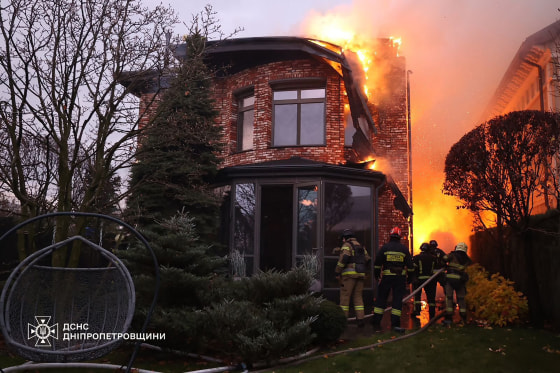
In the first instance of such a weapon being used during the conflict, Ukraine accused Russia on Thursday of launching an intercontinental ballistic missile as part of an overnight offensive. A Western official refuted the claim, stating that a ballistic missile rather than an ICBM was fired.
Spokesman Dmitry Peskov did not immediately address the accusation, instead directing inquiries to Moscow’s military ministry. The Western official stated that the impact of the missile, which was aimed toward the eastern city of Dnipro, was still being evaluated but declined to provide any details.
It’s unclear why the Kremlin would supposedly employ an ICBM against its neighbor given that they normally have a range of at least 3,400 miles. Both nuclear and non-nuclear payloads can be carried by such missiles.
The purported use of the ICBM follows two days after Ukrainian forces launched their first long-range American ATACMS missiles at Russian territory, a move that Moscow had long threatened would trigger a serious retaliation. On Wednesday, Ukrainian soldiers also fired long-range Storm Shadow missiles, provided by the British, inside Russia for the first time, according to the Kremlin.
According to the Ukrainian air force, the purported ICBM was fired from the Astrakhan region of southern Russia, which is located in the Caspian Sea, at Dnipro. However, the force stated that it has not yet been notified if any people were harmed. The precise missile model that was used was not specified.
The air force claimed in a Telegram statement that Moscow had also used a variety of additional missiles to assault Dnipro. It claimed that Ukrainian military had shot down six cruise missiles and that Russian aircraft had fired seven cruise missiles and an air-launched ballistic missile.
The regional authority’s head, Serhii Lysak, said on Telegram that the Dnipro attack had harmed two individuals. According to local authorities, a separate attack on the eastern city of Kryvyi Rih injured 15 people.
The battle, which has now lasted over 1,000 days, is said to have escalated after President Vladimir Putin’s most recent nuclear saber mongering.
The Russian leader updated his nation’s nuclear doctrine earlier this week, which outlines the circumstances in which Moscow might contemplate deploying nuclear weapons. The revision justifies a Russian nuclear strike in the event that a non-nuclear nation backed by a nuclear state launches an assault.
For the first time, analysts have cautioned against drawing conclusions about Putin’s purported ICBM deployment.
Due to their expensive cost and relatively limited accuracy, such missiles are not very useful in conventional roles. However, nuclear forces expert Pavel Podvig stated that such a strike might be useful as a signal.
I would advise folks to remain composed and not assume that traveling across continents is always perilous. However, in a post on X, Podvig, a senior researcher at the U.N. Institute for Disarmament Research, stated that it should be treated seriously.
According to commentators, there is very little chance that the Kremlin will decide to use nuclear weapons in its conflict with Ukraine, especially at this point in time when its military is developing and its adversary is exhausted.
In recent months, Russian forces have taken the initiative and managed to squeeze out a string of territorial gains, especially on the front lines in the east. In their attempt to recapture captured territory in the Kursk border region of Russia, thousands of Kim Jong Un’s men have also supported them.
Despite the grave tenor of the Kremlin’s rhetorical response, observers said that while the West’s relaxation of limits on Ukraine’s deployment of long-range weaponry may help Kyiv, it is unlikely to significantly alter the tactical situation.
Russian nuclear use is less likely now than it was earlier in the conflict. According to Alexander Bollfrass, Head of Strategy, Technology, and Arms Control at the London-based International Institute for Strategic Studies think tank, Russia stands to gain little from taking the confrontation to a nuclear level because political and military developments benefit Russia.
There would be political repercussions in addition to the questionable military advantages of using those weapons.
In an email to NBC News on Wednesday, Bollfrass warned that using nuclear weapons would run the danger of offending China and other non-Western nations whose neutrality or support is essential to preserving the Russian war economy. Additionally, it would set up a very risky relationship with the incoming Trump administration.
Note: Thank you for visiting our website! We strive to keep you informed with the latest updates based on expected timelines, although please note that we are not affiliated with any official bodies. Our team is committed to ensuring accuracy and transparency in our reporting, verifying all information before publication. We aim to bring you reliable news, and if you have any questions or concerns about our content, feel free to reach out to us via email. We appreciate your trust and support!
